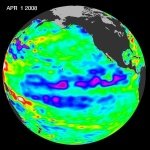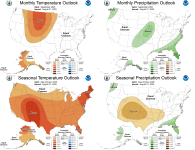El and Bill
New member
- Joined
- Nov 8, 2003
- Messages
- 3,200
- Reaction score
- 0
- C Dory Year
- 2000
- C Dory Model
- 22 Cruiser
- Hull Identification Number
- Sold in 2012
- Vessel Name
- Halcyon
The complexities of atmospheric science interlinked with oceanic currents are almost as difficult to understand as the debate over one or two engines on a C-Dory 22 – and the effects on C-Brat cruising this summer is about as clear cut.
Anyway, I’m hoping there might be someone in the pub that can set us straight on what we might expect in the way of weather patterns this summer in the Pacific NW. (I taught Oceanography, but that was back in the Paleolithic).
I understand we are currently in an ongoing La Niña, that began in the third quarter of 2007 and “has already influenced climate patterns … across many parts of the globe … including the Americas.” Although La Niña events often begin to weaken in January, this year “conditions have become slightly stronger.” The influence is strong this quarter and will perhaps continue into the third quarter of the year, thus perhaps affecting conditions for summer cruising. La Niña has sea surface tempts 1.5-2 degrees Celsius colder than average in the central and eastern Equatorial Pacific. (Adapted from materials provided by World Meteorological Organization)
There are several other complexities that enter the equation:
A larger oceanic event is occurring now – the early stages of a Pacific Decadal Oscillation (PDO) (fancy term for a basin-wide long-term (5-20 yrs) fluctuation of the Pacific Ocean that waxes and wanes between cool and warm). In the cool phase we are entering, higher than normal sea-surface heights caused by warm water form a horseshoe pattern that connects the north, west and southern Pacific, with cool water in the middle. During most of the 1980s and 1990s, the Pacific was locked in the oscillation's warm phase, during which these warm and cool regions are reversed. http://www.cdc.noaa.gov/cgi-bin/Correla ... r.test1.pl
Superposed on La Niña and the PDO is the global warming cycle, we hear so much about.
Does anyone have the information on what scientists are predicting from these oceanic and atmospheric variations that might affect our weather this summer in the NW?
A personal aside – I got into this research stuff since recent geological research has demonstrated that the earth changes shape due to these temperature variations in the ocean (crustal bulges under warm ocean, contraction under cold). Interesting to a geologist and this evolved my hypothesis that the changes in earth shape might be ‘trigger’ events for causing earthquakes in regions of crustal stress. (Just had another 4.6 quake off the Oregon coast yesterday). Whew – back to one engine or two on C-Dorys...that must be easier to discuss.
Any ideas about this summer’s conditions in Pac NW?
Anyway, I’m hoping there might be someone in the pub that can set us straight on what we might expect in the way of weather patterns this summer in the Pacific NW. (I taught Oceanography, but that was back in the Paleolithic).
I understand we are currently in an ongoing La Niña, that began in the third quarter of 2007 and “has already influenced climate patterns … across many parts of the globe … including the Americas.” Although La Niña events often begin to weaken in January, this year “conditions have become slightly stronger.” The influence is strong this quarter and will perhaps continue into the third quarter of the year, thus perhaps affecting conditions for summer cruising. La Niña has sea surface tempts 1.5-2 degrees Celsius colder than average in the central and eastern Equatorial Pacific. (Adapted from materials provided by World Meteorological Organization)
There are several other complexities that enter the equation:
A larger oceanic event is occurring now – the early stages of a Pacific Decadal Oscillation (PDO) (fancy term for a basin-wide long-term (5-20 yrs) fluctuation of the Pacific Ocean that waxes and wanes between cool and warm). In the cool phase we are entering, higher than normal sea-surface heights caused by warm water form a horseshoe pattern that connects the north, west and southern Pacific, with cool water in the middle. During most of the 1980s and 1990s, the Pacific was locked in the oscillation's warm phase, during which these warm and cool regions are reversed. http://www.cdc.noaa.gov/cgi-bin/Correla ... r.test1.pl
Superposed on La Niña and the PDO is the global warming cycle, we hear so much about.
Does anyone have the information on what scientists are predicting from these oceanic and atmospheric variations that might affect our weather this summer in the NW?
A personal aside – I got into this research stuff since recent geological research has demonstrated that the earth changes shape due to these temperature variations in the ocean (crustal bulges under warm ocean, contraction under cold). Interesting to a geologist and this evolved my hypothesis that the changes in earth shape might be ‘trigger’ events for causing earthquakes in regions of crustal stress. (Just had another 4.6 quake off the Oregon coast yesterday). Whew – back to one engine or two on C-Dorys...that must be easier to discuss.
Any ideas about this summer’s conditions in Pac NW?


